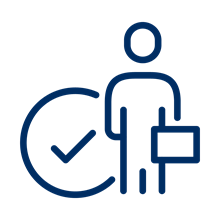Extension of Ontario Seniors’ Home Safety Tax Credit
 In the 2020 Ontario Budget, the provincial government introduced the temporary Seniors’ Home Safety Tax Credit (“SHSTC”). Today, the government proposes to extend this credit by one year to 2022.
In the 2020 Ontario Budget, the provincial government introduced the temporary Seniors’ Home Safety Tax Credit (“SHSTC”). Today, the government proposes to extend this credit by one year to 2022.
The conditions and limitations in respect of the SHSTC, a refundable 25 per cent tax credit, are the same as those for 2021. The credit is computed on eligible expenses of up to $10,000 per year, and available to senior homeowners and renters or people who live with senior relatives. These expenses can be shared by the people who live together, including spouses and common-law partners.
The maximum SHSTC is $2,500 for the tax year.
Eligible expenses on which the credit is computed include the following:
- Renovations to permit a first-floor occupancy or secondary suite for a senior;
- Grab bars and related reinforcements around the toilet, tub and shower;
- Wheelchair ramps, stair/wheelchair lifts and elevators;
- Non-slip flooring;
- Additional light fixtures throughout the home and at exterior entrances;
- Automatic garage door openers; and
- Modular or removable versions of a permanent fixture, such as modular ramps and non-fixed bath lifts.
The above expenses must be paid or become payable in 2022 and incurred for renovations that improve safety and accessibility or help a senior be more functional or mobile at home. By home, the government means the individual’s principal residence or a residence that they can reasonably expect will become their principal residence within 24 months following the end of the particular claim year.
An individual could claim the credit for their share of improvements done by a condominium corporation, or similar body, to property that includes the individual’s principal residence, to the extent that the improvements meet the eligibility conditions.
Individuals should retain receipts for eligible expenses.

 The Ford government is proposing a new temporary Ontario Staycation Tax Credit (“OSTC”) for the 2022 taxation year. This will be a personal refundable tax credit computed as 20 per cent of eligible accommodation expenses in Ontario. The maximum amount of expenses on which the credit will apply is $1,000 for an individual and $2,000 for a family. Individuals can claim this credit on their 2022 personal tax returns.
The Ford government is proposing a new temporary Ontario Staycation Tax Credit (“OSTC”) for the 2022 taxation year. This will be a personal refundable tax credit computed as 20 per cent of eligible accommodation expenses in Ontario. The maximum amount of expenses on which the credit will apply is $1,000 for an individual and $2,000 for a family. Individuals can claim this credit on their 2022 personal tax returns.
 In the
In the  The government is proposing amendments to the Business Corporations Act to introduce beneficial ownership information requirements, the purposes of which are to prevent and better detect the use of corporations for tax evasion, money laundering or other illicit financial activities. These amendments will put Ontario on equal footing with most other Canadian jurisdictions.
The government is proposing amendments to the Business Corporations Act to introduce beneficial ownership information requirements, the purposes of which are to prevent and better detect the use of corporations for tax evasion, money laundering or other illicit financial activities. These amendments will put Ontario on equal footing with most other Canadian jurisdictions. 



